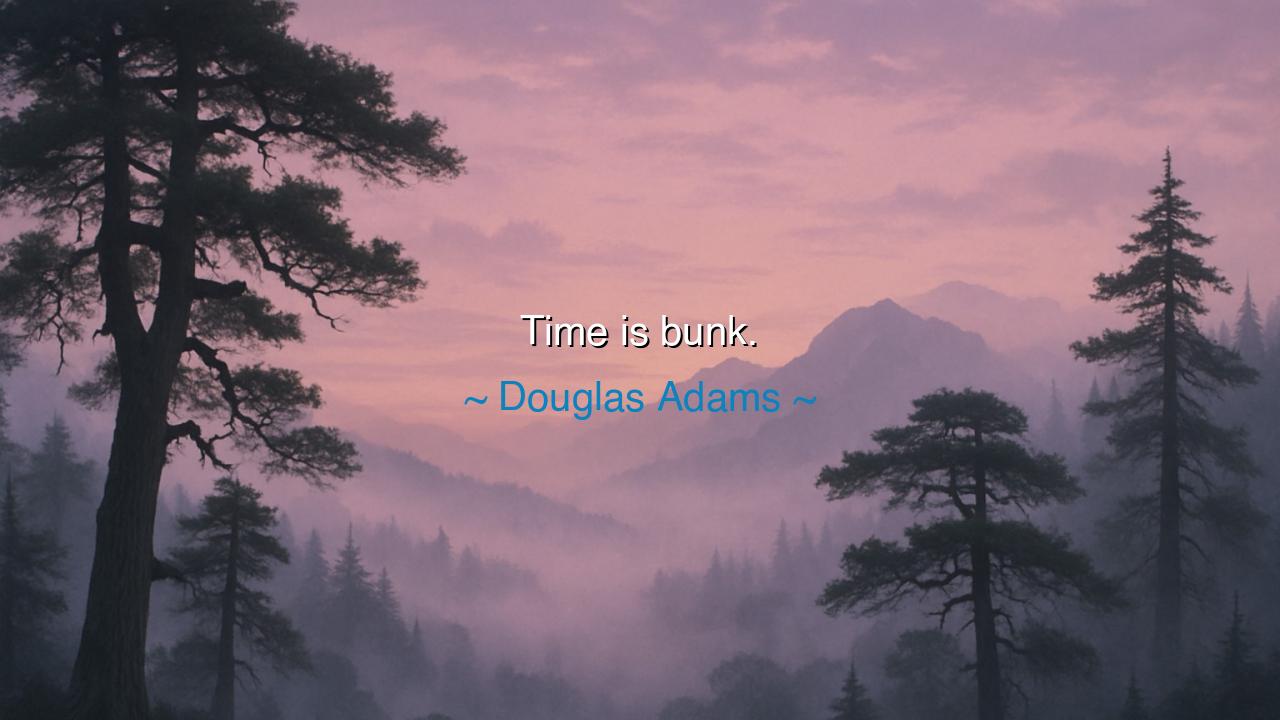
Time is bunk.






Hear, O seekers of laughter and wisdom, the curious words of Douglas Adams: “Time is bunk.” Though spoken with the tongue of satire, these words strike deeper than jest. For Adams, master of cosmic humor and sharp-eyed philosopher of the absurd, knew that what men call time is a fragile construct, an illusion stitched together to comfort mortals as they stumble through the vastness of existence. In declaring it “bunk,” he tears away the veil, mocking our slavish obedience to clocks and calendars, and invites us to see life not as a prison of minutes, but as a grand, unpredictable dance.
The origin of this saying lies in Adams’s world of The Hitchhiker’s Guide to the Galaxy, where laws of physics, reason, and logic are twisted into comedy that reveals truth. In his stories, the absurdity of time—with its paradoxes, its relativity, its strange folds and loops—becomes a source of both hilarity and insight. By calling it “bunk,” Adams echoes the philosophers and scientists who remind us that our understanding of time is limited, that it is not a rigid master but a strange, elastic dimension, far beyond our simple measurements.
Consider how Einstein himself shattered the world’s old vision. To him, time was not absolute but bound with space, bending under gravity, moving differently for the traveler and the still. What once seemed eternal truth crumbled into relativity. Imagine, then, the wisdom in Adams’s playful words: that much of what we call time is a human invention, a way of coping with something far greater and stranger than we can grasp. What better way to describe this than to call it “bunk”—a word of humor masking a depth of truth?
Yet, Adams’s teaching is not merely scientific jest. It is also a call to free the spirit. For how many are enslaved by time—measuring their worth in deadlines, aging in anxiety, watching the clock while forgetting to live? By laughing at time, Adams sets us free. He reminds us that while minutes may march on, life itself is not in the ticking of the clock but in the fullness of our experience. To see time as “bunk” is to refuse to let it rule us, to claim instead the present as our kingdom.
Think also of the explorers of the seas. When Columbus sailed west, he sailed not by the tyranny of hours but by the constancy of stars. His courage was not measured by clocks, but by vision. The schedules of men would have told him it was madness, but the greater truth lay beyond such measures. So too must we see beyond the petty counting of hours, for greatness is not born of calendars but of daring.
The lesson is thus: do not worship time as a god. It is but a tool, a measure, a convenience. Life is not in the hours you count, but in the depth with which you live them. The man who lives a single day with courage and joy has lived more fully than the one who spends a hundred years in worry and regret. To call time “bunk” is to awaken to this truth: that meaning lies not in duration but in intensity, not in length but in depth.
Practical counsel follows. Do not waste your life staring at the clock. Work, yes, but do not forget to laugh, to love, to wonder. Use time as a servant, not a master. Step outside the prison of schedules when you can, and enter the eternity of the present moment. Read, create, walk beneath the sky, speak words of kindness—these are acts that belong to eternity, not to the minutes that slip away.
So let Douglas Adams’s playful wisdom be your guide: “Time is bunk.” Laugh at it, live beyond it, and do not let its ticking chains enslave your soul. For in truth, what matters is not the hours we are given, but the life we dare to live within them. And in this way, you will find freedom—not from time itself, but from the illusion that it defines who you are.






AAdministratorAdministrator
Welcome, honored guests. Please leave a comment, we will respond soon